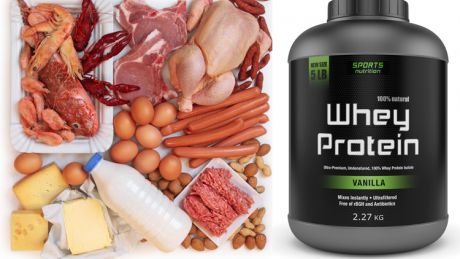Protein: 6 common questions answered
MF answers some of your most pressing protein related questions

Protein is the key nutrient for anyone looking to build muscle and burn fat, but it comes in many guises from powders and supplements to premium steaks and peanuts. While many people know that having plenty of protein in your diet is important, there are still a lot that people tend to be unsure of. How much should you eat? What are the best sources? Etc. So take note, MF have taken the liberty of answering some of the most common questions related to the mightiest of macronutrients.
1. Is it better to take protein powder or eat real food?
This is quite objective really. Of course it isn’t the best idea to source all of your intake from protein powder, if you were to only ever be using one, it should be whole foods, but there is an important place in your diet for both. Powders are great due to their sheer convenience, value for money, immunity-boosting benefits and the fact that they can be digested far quicker post-workout than an entire steak. On the flip side, whole foods provide myriad additional nutrients such as iron and magnesium that many powders do not. Striking a balance between the two is always advised, but as we mentioned if you have to leave one out just ask what you’d rather, gorge on a whole roast chicken or down another cookie and cream flavoured shake? Read our round-up of the best high protein foods.
2. What stands out as the best source of protein?
Again this isn’t a question that has a definitive answer. What you should be looking for is anything that is considered a ‘complete protein’, containing an adequate amount of all nine of the essential amino acids. These are deemed ‘essential’ because the body cannot produce them on its own. Animal protein sources such as milk, eggs, fish and meat are deemed complete proteins, containing all of the building block that the body requires. Of course, a piece of salmon is going to have more protein in it than one egg, but they are both considered complete proteins so are therefore what you want to be feeding your body with.
3. Does the more protein I consume equate to faster muscle gains?
Yes, it does work out like that, in a sense. Not all of the protein that you feed your body goes toward protein synthesis. Once you have fed your body enough of the good stuff to drive protein synthesis it will start to oxidize the protein for energy. Because of this there is no real need to overload on protein as driving your intake far beyond 30-40% of your GDA is unlikely to offer additional muscle-building benefits. What it will do is start to cut into your carb and fat intake, which could end up hindering your goals.
4. Is it possible to put on fat if I eat too much protein?
The common though is that if protein is the main building black for muscle then eating loads of it couldn’t possible make you fat, could it? Unfortunately that isn’t the case as a caloric overload could occur which will make you put on weight. Of course it is much harder for protein to be converted into fat than certain other nutrients, but you have to bare in mind that if your protein intake goes up a lot protein oxidation will start to increase, which means you will burn far fewer fats or carbohydrates a fuel.
5. Is protein more necessary for endurance athletes or weight lifters?
It’s a natural assumption that because weightlifters are aiming to build muscle and strength they will have a greater need for protein than endurance athletes will. This isn’t necessarily the case, and the question is best answered on a person by person-basis. An endurance athlete who is pushing themselves to their limits and training really hard will need more protein simply because their energy needs are so very high. This would be essential if they are hell bent on losing weight. Where as a competitive bodybuilder would need insanely high amounts of protein / calories in their diet to fuel their body. So it’s really dependent on the individual’s workout and goals.+
6. Can your body really only use 30g of protein at one time?
It seems to be quite a common misconception that the body is only able to process a specific amount of protein per meal, like an alarm goes off when it’s had a certain amount and it stops taking it onboard. This isn’t really how it works. Of course it isn’t advised that you take on 150g of protein in each meal, but the fact is that the body will always process whatever you give it, it might just not do it in the best possible way.
Get the Coach Newsletter
Sign up for workout ideas, training advice, reviews of the latest gear and more.
You will digest all of the protein that you eat, but more isn't always better. Once you turn on protein synthesis and initiate the muscle-building process, you can't turn it on "more" in one meal. Roughly 30 grams of protein per meal across multiple meals will actually help you boost protein synthesis many times over the course of a day. This will be way easier on your digestive system as well.
Coach is a health and fitness title. This byline is used for posting sponsored content, book extracts and the like. It is also used as a placeholder for articles published a long time ago when the original author is unclear. You can find out more about this publication and find the contact details of the editorial team on the About Us page.

